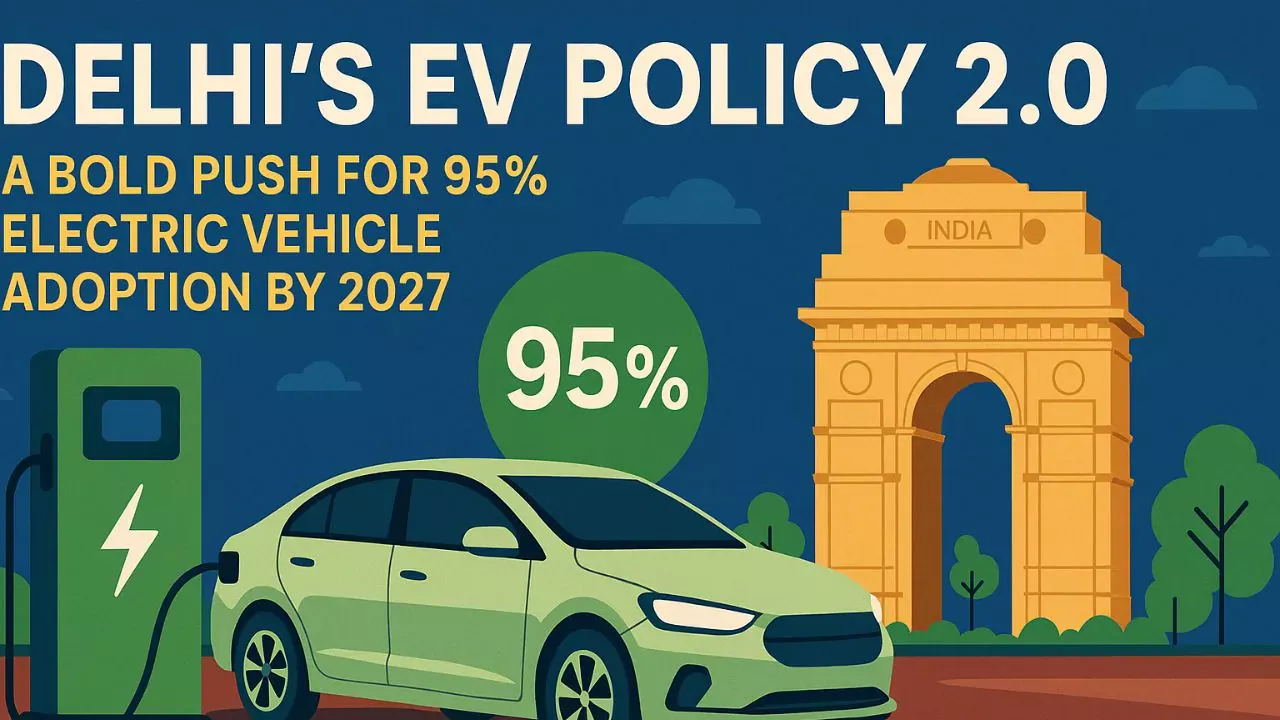Delhi, April 23, 2025 – Delhi is accelerating its journey toward a greener future with the ambitious Delhi EV Policy 2.0, targeting 95% electric vehicle (EV) adoption by 2027 and an impressive 98% by 2030. This groundbreaking draft policy introduces strict measures, generous subsidies, and robust infrastructure plans to transform the capital into an EV hub. Here’s everything you need to know about Delhi’s electrifying roadmap.
Key Highlights of Delhi EV Policy 2.0
1. Ban on Fossil Fuel Vehicles
To curb pollution and promote sustainable mobility, Delhi is phasing out fossil fuel vehicles with bold deadlines:
- No new registrations for petrol, diesel, and CNG two-wheelers after August 15, 2026.
- CNG auto registrations will cease from August 15, 2025, with no permit renewals for CNG autos, mandating a full transition to electric autos.
- Garbage collection vehicles must be 100% electric by December 2027, ensuring cleaner urban services.
These measures align with Delhi’s commitment to reducing carbon emissions and combating air pollution, a persistent challenge in the capital.
2. Generous Subsidies and Incentives
To make EVs accessible, the Delhi government is rolling out attractive financial incentives:
- ₹36,000 subsidy for women purchasing electric vehicles, encouraging inclusivity in the EV revolution.
- Extension of the existing EV policy by three months, ensuring continued power subsidies to lower running costs for EV owners.
- These incentives aim to make electric two-wheelers, autos, and cars more affordable, driving mass adoption.
3. Robust Infrastructure Push
Delhi is tackling range anxiety head-on with a comprehensive charging infrastructure plan:
- 20% EV parking mandated in new buildings to prioritize electric vehicles.
- Kerbside charging stations for convenient access across the city.
- Chargers under flyovers, utilizing urban spaces creatively to expand the charging network.
- Plans for battery collection centers to support recycling and sustainability.
This infrastructure push ensures EV owners have reliable, accessible charging options, making electric mobility seamless.
4. Consumer Impact: Mandatory EV Adoption
The policy introduces a unique rule for vehicle owners:
- If a person owns two fossil-fuel vehicles, their next vehicle must be electric. This nudge encourages households to embrace EVs sooner, aligning with Delhi’s aggressive targets.
Why Delhi’s EV Policy 2.0 Matters
Delhi’s EV Policy 2.0 is a game-changer for India’s electric vehicle ecosystem. With 7.8% EV penetration in FY25, India is striving for a 30% target by 2030. Delhi’s bold targets—95% by 2027 and 98% by 2030—set a precedent for other states, positioning the capital as a leader in sustainable urban mobility.
The policy addresses key barriers like high upfront costs, limited charging infrastructure, and consumer hesitancy. By combining strict regulations, subsidies, and infrastructure development, Delhi is creating a blueprint for rapid EV adoption.
Challenges and Opportunities
While the policy is ambitious, challenges remain:
- Infrastructure scalability: Rapidly expanding charging networks to meet demand.
- Consumer awareness: Educating vehicle owners about EV benefits and subsidies.
- Industry readiness: Ensuring manufacturers can supply affordable, high-quality EVs.
However, the policy opens doors for opportunities:
- Job creation in EV manufacturing, charging infrastructure, and battery recycling.
- Investment potential in companies like Ola Electric, Tata Motors, and Mahindra & Mahindra.
- Cleaner air and reduced dependence on fossil fuels, improving public health.
What’s Next for Delhi’s EV Revolution?
Delhi’s EV Policy 2.0 is a bold step toward a sustainable future, but its success hinges on execution. Stakeholders, including government bodies, automakers, and consumers, must collaborate to overcome challenges and achieve the 95% adoption target by 2027. With global players like Tesla eyeing India and local giants like Ola Electric scaling up, Delhi’s EV ecosystem is poised for exponential growth.
Share this article to spread the word about Delhi’s bold EV vision!

